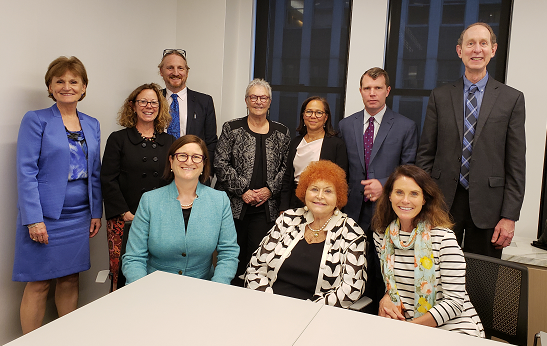News & Updates — President’s Update
The leadership of the Foundation for Opioid Response Efforts (FORE) is dedicated to deploying our resources in the most impactful way. To do so, we convened four advisory meetings over the past several months, with the aim of understanding the range of existing approaches to opioid use disorder (OUD) prevention and treatment and how we might contribute through grantmaking, convenings, partnerships, and information dissemination.
The program advisory meetings were also an opportunity to seek guidance on areas of work FORE should avoid — either because they duplicate other efforts, have too narrow a focus, or are unlikely to have an impact. Engaging experts in state and federal policy, addiction medicine and primary care, pharmacy, criminal justice, health insurance, rural health, veterans’ health, women’s health, and other fields informed our first request for proposals on access to treatment, as well as the selection of our inaugural grants, which will be announced shortly.

In the meantime, we wanted to share summaries of the discussions and recommendations of our experts. The following three summaries are now available in our new Resources section of our website:
- Access to Treatment: Vulnerable Populations
- Medical Education and Training
- Access to Treatment: Delivery System and Payment Models
A fourth summary, on Improving Clinical Practice of Pain Management, will be available soon.
Our first advisory meeting, which focused on access to treatment, offered a sobering account of the challenge: only one of nine people coping with a substance use disorder receives treatment. As with other parts of our health care system, there are racial, economic, and geographic disparities in who gets treatment, with certain groups — including minorities and those involved in the criminal justice system — at particular risk. Poor access to effective treatment equates to higher mortality. Participants also noted that many people coping with OUD need more than medical treatment to rebuild their lives, including counseling and wraparound supports.
In June, we heard from experts about ways to train and equip the next generation of clinicians to help prevent, identify, and treat opioid addiction. Experts emphasized the importance of giving medical students and residents opportunities to see the effectiveness of OUD treatment firsthand in hopes of reducing bias against what some may see as “difficult” patients. They also called for development of new models that bring clinical specialties together and foster interdisciplinary training so that students of the health professions — including physicians, nurses, social workers, pharmacists, dentists, and others — learn to work as a team to provide care.
During our July advisory meeting, we explored health care delivery and payment reforms that may help expand access to OUD treatment. The group considered innovative models such as Vermont’s hub-and-spoke approach, in which specialized drug treatment centers treat the most clinically complex patients are connected with primary care practices who are supported to be able to treat those with less complex needs. Others pointed to the health home model, which has been used to offer coordinated physical and behavioral health care for people with multiple chronic conditions, including mental health and substance use disorders. Participants suggested that peer support coaches and telehealth tools could help engage more people in treatment. Expansion of the clinical workforce, better performance metrics, and new payment policies would be needed to help spread and scale effective treatment models.
Our sincere thanks to the many leaders who contributed their time and expertise to these discussions. We will continue to draw on their suggestions and hold additional advisory meetings as we move forward.
(Picture: Participants in our first advisory meeting on ‘Access to Treatment’ included (from left to right) Mary Wakefield, Ph.D., R.N. (Chair), Elizabeth Connolly, Mishka Terplan, M.D., M.P.H., Kelly J. Clark, M.D., M.B.A., Judge Peggy Fulton Hora (retired), Loretta Finnegan, M.D., Douglas Olson, M.D., Hendree Jones, Ph.D., and Mark Levine, M.D.)